Eurovision icon Loreen on leaning into fear, finding purpose, and embracing your power
Drag star Dakota Schiffer sits down with Swedish singer Loreen to discuss everything from creativity and community, to trusting your intuition
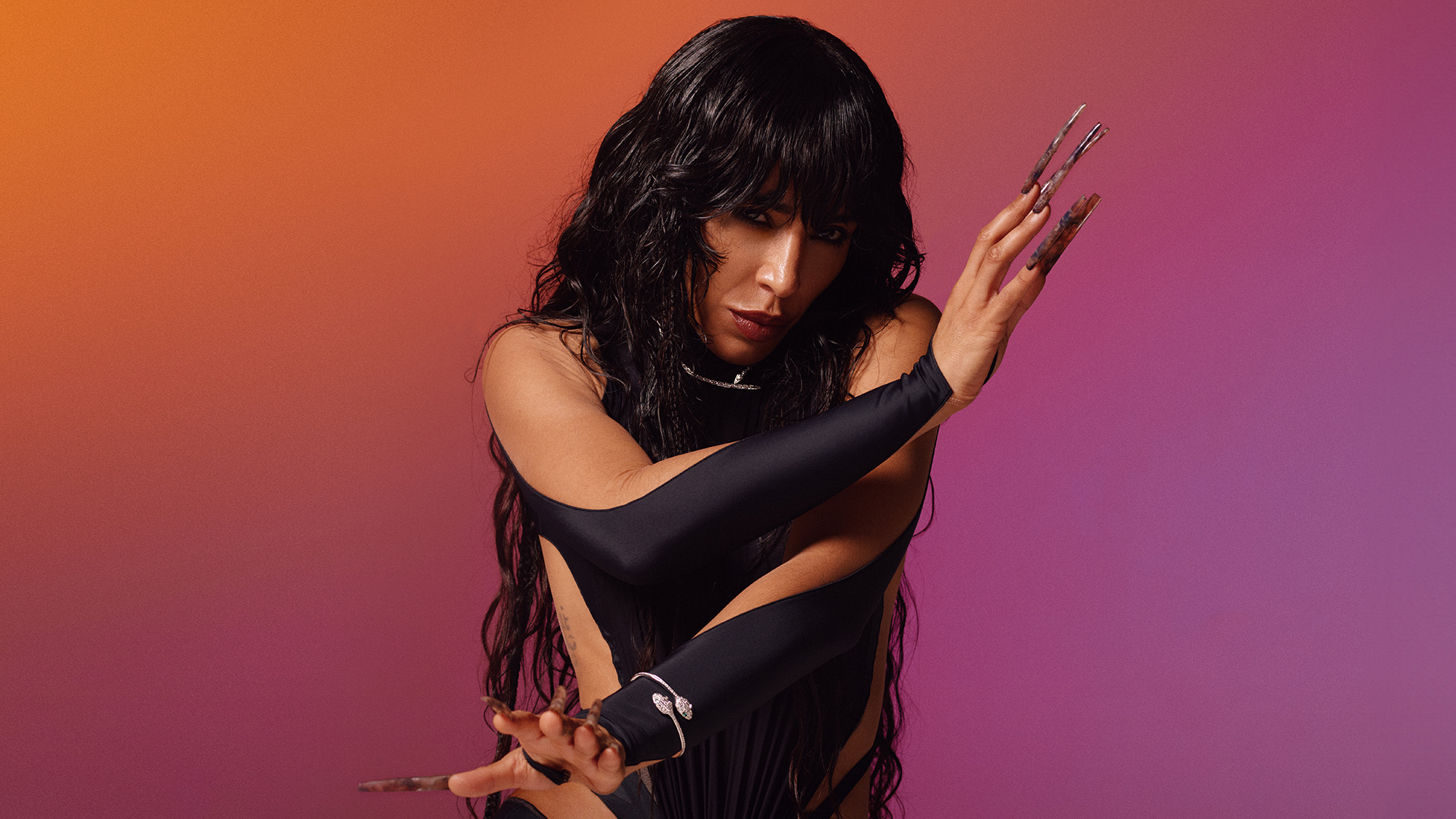

Sunil Makan
Loreen is Eurovision royalty, with the Swedish singer-songwriter being one of only two people to have won the song contest twice; once in 2012 with Euphoria and again in 2023 with Tattoo.
However, it is her advocacy that has garnered her an enormous fanbase over the years, with the 39-year-old devoting her platform to speaking up for others, particularly the LGBTQ+ community, which she cites as her biggest inspiration. (Loreen came out publicly as bisexual in 2017, famously stating, “Love is where you find it”.)
Now a Pride icon, Loreen even bagged an Attitude Pride Award this year for her role in “championing rights” and “challenging stigma in the face of adversity”. And among her many fans is British drag performer Dakota Schiffer – a Marie Claire UK favourite since she burst onto our screens in the fourth, and most recent, season of RuPaul’s Drag Race UK.
For our ‘Love Is Where You Find It’ special, we brought these two trailblazing performers together for a stunning shoot and empowering conversation that saw Dakota interview the legend that is Loreen. Together, they talked about stepping into fear, discovering the power of purpose and finding support within the LGBTQ+ community. Here is their conversation…
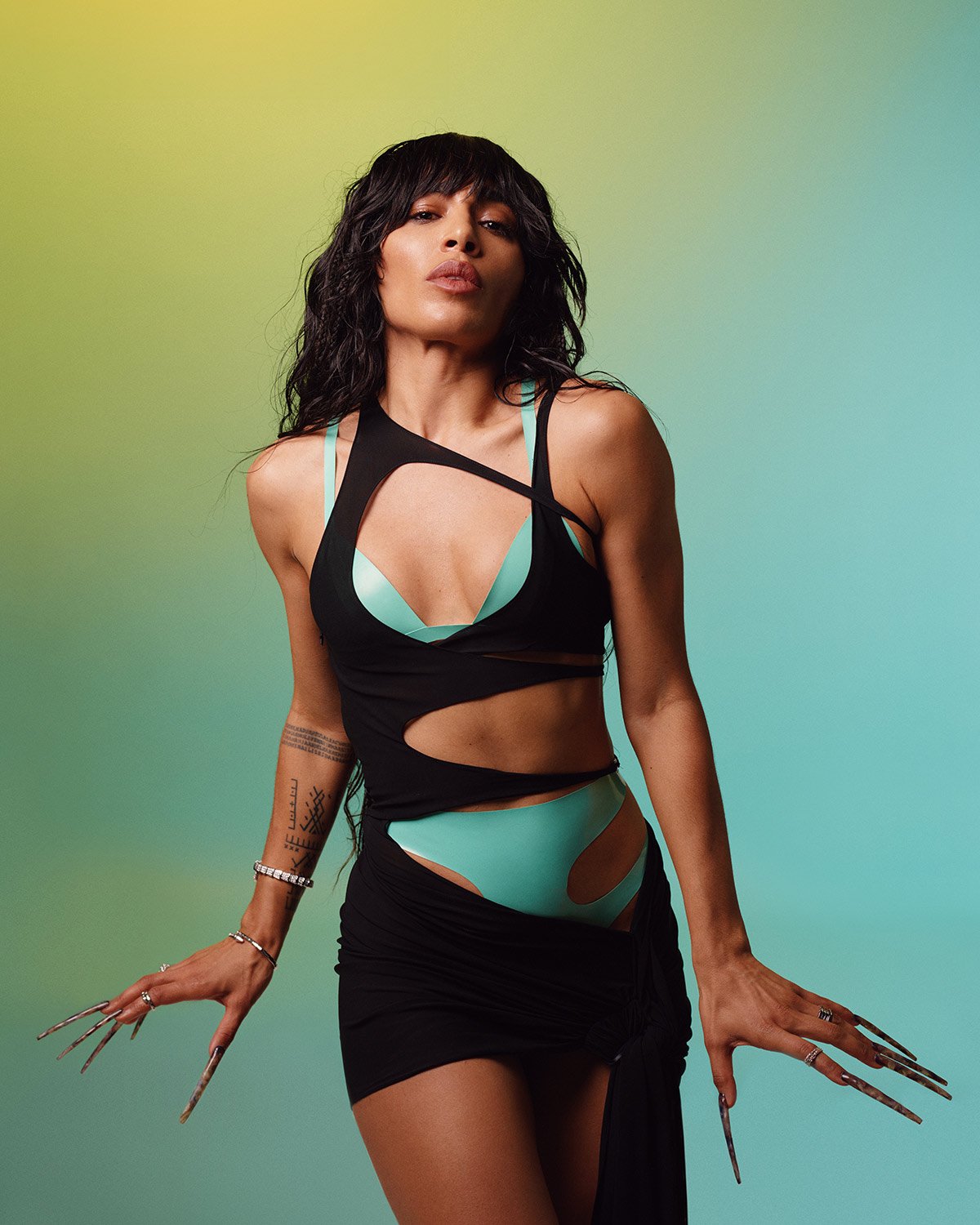
Loreen wears: Latex bra, £85 and latex cut out briefs, £55 both Elissa Poppy, Cut out dress, £990, Mugler, (Loreen’s right hand) Serpenti viper ring, £3,540 at Bulgari , Serpenti seduttori ring, £14,700 at Bulgari, Serpenti viper bracelet, £6,300 at Bulgari, Serpenti viper 18kt white gold pave diamond bracelet, POA, at Bulgari, (left hand) B.Zero1 18kt white gold ring, £3,200, Bulgari
DAKOTA: Activism has always been central to your work. You sent a strong message when you decided to meet with human-rights activists at the 2012 Eurovision Song Contest. What did that feel like?
LOREEN: It was very natural for me. I found out what was going on before I came to Azerbaijan, and I have a spiritual side to me – I believe that you get certain information for a reason. So when I understood the people’s situation, I instantly started to plan – this was in Sweden, before even going to Azerbaijan. You know, what can we do? And how can we help these people? Because at the end of the day, there’s nothing more important than human life.
So that was an easy choice to make. I learned the rules, I planned what I was going to do down there, which people I should talk to, and I took help from a health organisation called Civil Rights Defenders. We set a plan and then we went down. My belief is that creativity is a really powerful tool – it has a lot of positive energy and it can just clean up everything. If you use it the right way, you can help people heal.
Celebrity news, beauty, fashion advice, and fascinating features, delivered straight to your inbox!
DAKOTA: That’s so poignant, and it’s certainly how I feel about creativity. It can bring joy to people, it tells so many stories and I think, as a medium, creativity is so unifying. I think it's so important that it doesn't even sound like something you had to debate – it came as second nature. You found out about it, wanted to do something about it, and were proactive. I admire you for that, and you should be commended for that. I think that’s just a really wonderful story. I mean, it's certainly on theme with the pride and activism we’re here for.
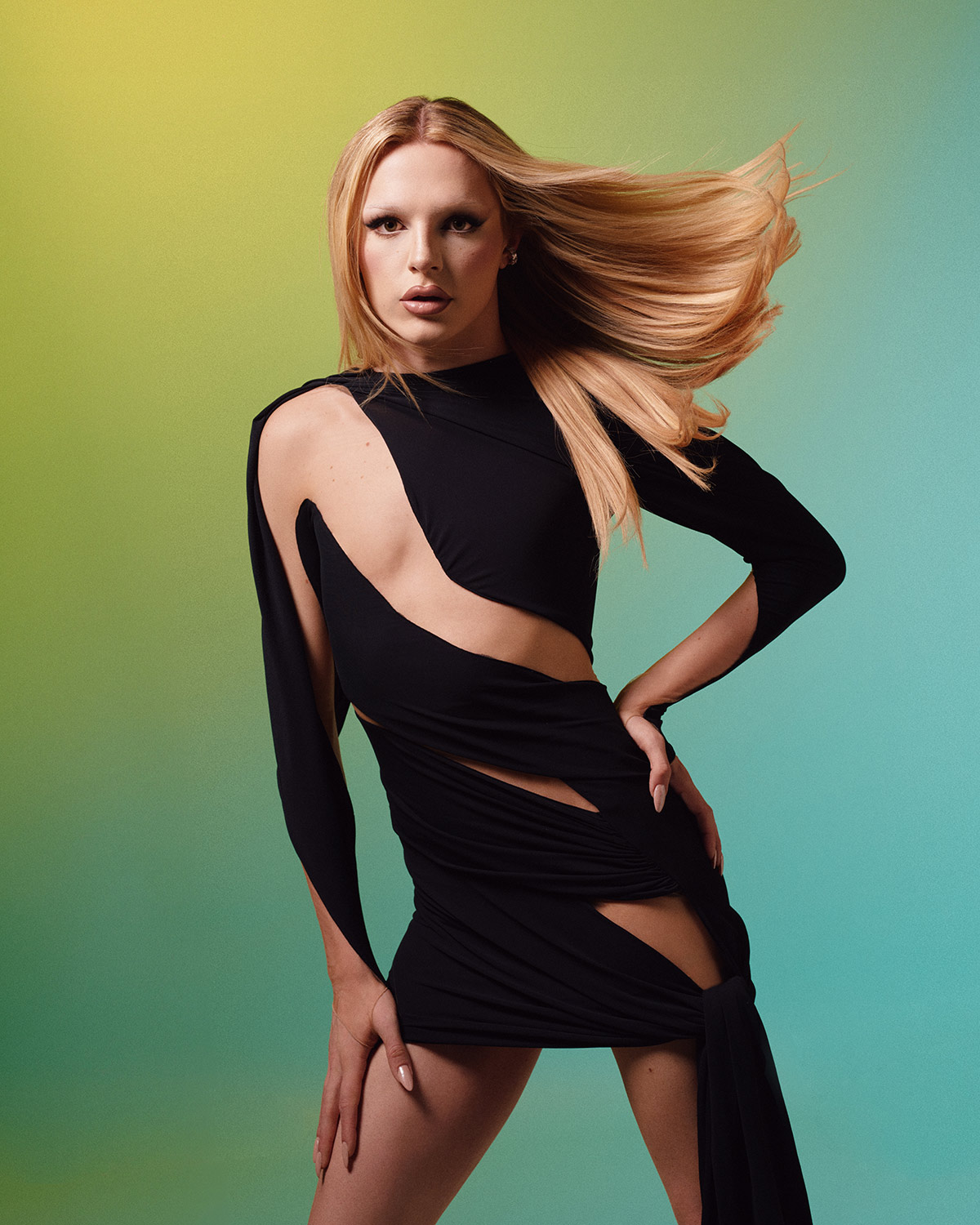
LOREEN: I think sometimes we forget that everything is connected. This is science, you know? And we forget that we should collectively be responsible for each other. This is why I also think it’s really important to act because I believe that if there are people hurting on the other side of the world, at some level, you’re hurting yourself – there is no separation. But I do understand why certain creators don’t want to use their creativity for a cause because there’s a lot of fear around that.
DAKOTA: I think it’s great that you do and I wish more people did. I’ve grown up in an era where people try to politicise a lot of creative art forms. My art form, in particular, is politicised all the time and I find it very difficult to navigate. I love talking about politics and using my art to help people, but because of my existence as a trans woman, my art is always going to be political, and sometimes that can be frustrating.
If I enter a space, it’s already political just by the sheer existence of me being there; the way I look and the way I present myself. It's not even an active choice. And you were saying about second nature – my identity is second nature to me. It’s how I’ve always been. But it’s funny that by being filmed or there just being a microphone near me, it's political, and it can be frustrating because I don't necessarily feel like that lens is always the best way to view people like us.
Off the back of advocating for others, do you ever remember a particular time when someone advocated for you? And what was it [about that experience] that made it become second nature to you?
LOREEN: I’ve had some key people and a key community standing up for me, but I think the first person that comes to mind is actually my mother. She is the strongest person I know. She was 16 when she had me and she came from very poor conditions. She fled her country all by herself and raised me to be the woman that I am. A really powerful human not taking no for an answer and fighting for her freedom and her right to exist – this is my mother. She always reminded me that there is no one above you. The same level, yes, but never above you, and this is a really important mindset to have.
But then when you come out to the world, you try to find your place, and I think that the second important, not even person but community for me, was the LGBTQ+ community. I wouldn’t be sitting here if it wasn’t for them. They accepted me for who I am, with everything that I am.
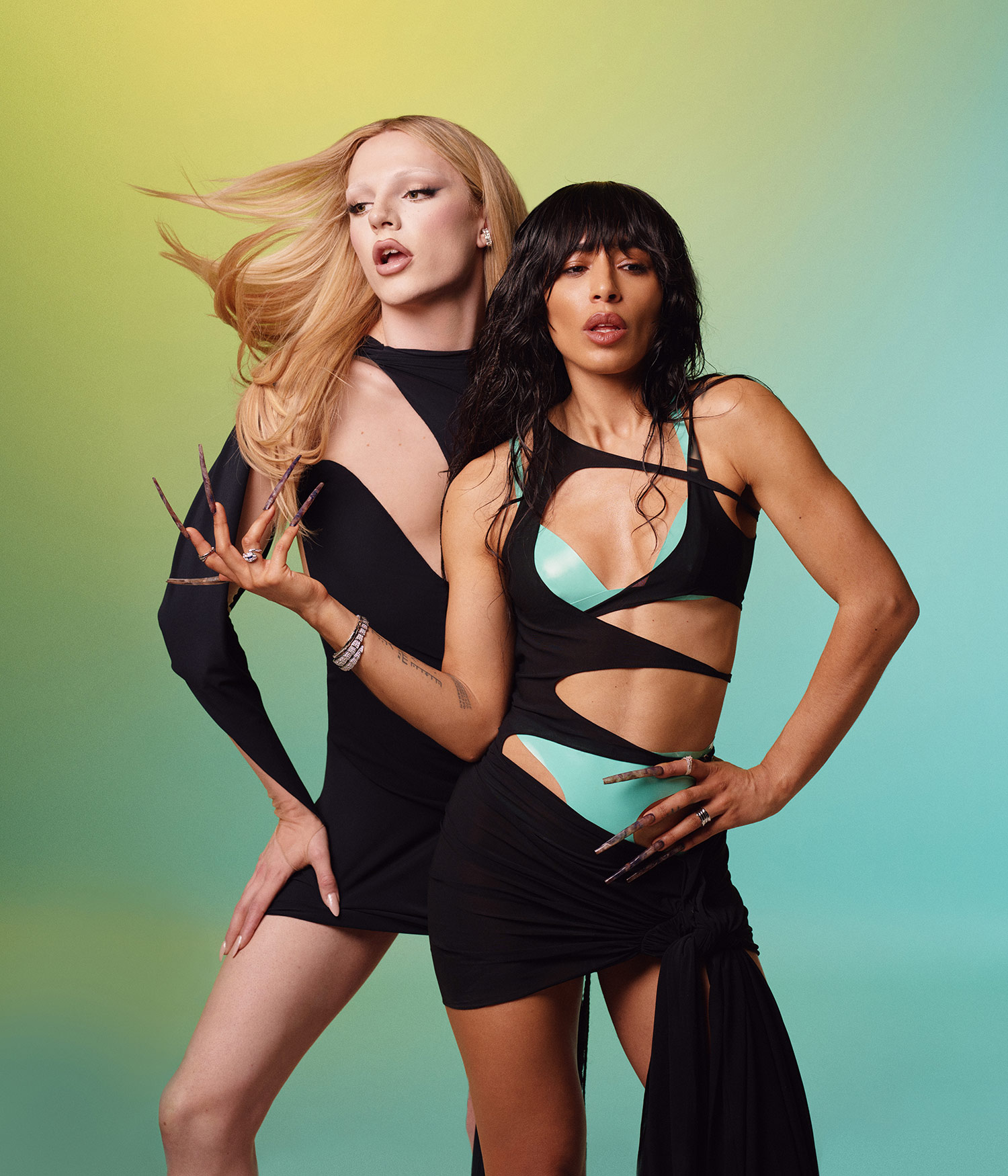
Dakota wears: Millenia clip earrings, £135, Swarovski, Impossible neckline dress, £1,599, Mugler.
Loreen wears: Latex bra, £85 and latex cut out briefs, £55 both Elissa Poppy, Cut out dress, £990, Mugler, (Loreen’s right hand) Serpenti viper ring, £3,540 at Bulgari , Serpenti seduttori ring, £14,700 at Bulgari, Serpenti viper bracelet, £6,300 at Bulgari, Serpenti viper 18kt white gold pave diamond bracelet, POA, at Bulgari, (left hand) B.Zero1 18kt white gold ring, £3,200, Bulgari
DAKOTA: Is there a particular moment where you remember finding pride in yourself and your identity?
LOREEN: I think one moment, where I really felt that I liked and trusted myself and who I was, was with Euphoria. Because the universe was talking to me at that moment when I was standing there. I had won Eurovision and I had trusted my intuition, with everybody against me. And that is the test; I realised that life was testing me. It’s been testing me the whole time to see how much you will trust your intuition. And when you do, the payoff is amazing. I did trust it, and I really liked myself for it. I have to say, we look at struggle the wrong way. Struggle can sometimes be good because it strengthens us. It makes us so much better than we thought we could be, so I look at hard times that way. I’m like, “Oh it’s so painful right now, but oh my God, when I come out of this…”.
DAKOTA: There are certain cultural zeitgeists in the world that LGBTQ+ people have centred themselves around – Eurovision being one of them, Drag Race being another. I think that when the community comes together, we find these places champion us, and other queer individuals and queer performers. But is there a place that championed you before you had access to those spaces?
LOREEN: The first thing that comes up is the one space and state of mind where I feel complete; where there is no future, no past, there’s just me, and I am totally empowered. And that is when I am singing. In that moment, I forget everything that I am thinking and doing – it is a very spiritual space. And whenever I wake up from that or it’s done, I’m like, “Oh yeah, this body”, so it’s very powerful. And this is not only singing, this is creativity. This is what doing your makeup does to you, this is what doing your nails does to you. You know, setting yourself free with singing and dancing, that is a space. I’ve had that space since I was a kid, and I think a lot of us have access to that.
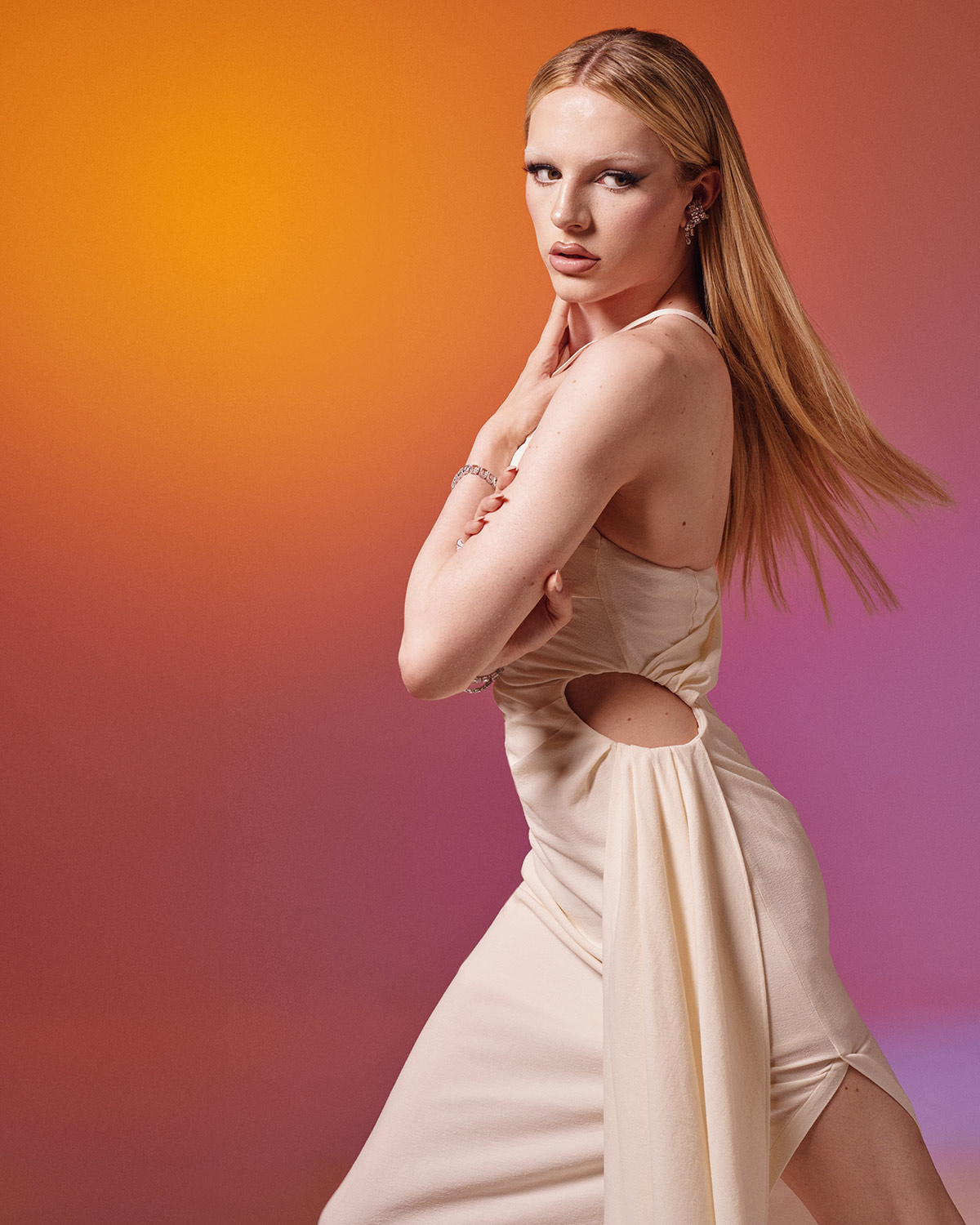
DAKOTA: I think that’s such a great way of putting it because it’s not necessarily a physical space, but one of those things where you almost forget who you are for a second and time stops, and you forget that you’re in this body. It’s just a sheer moment of creative expression, and that’s just such a wonderful thing. I didn't even really think of it that way for me until today!
And I do disappear – when I was walking the runway or in front of a camera, I would actually disappear sometimes. I don't know why, but it's that moment of creativity. It’s a space you create for yourself.
LOREEN: And I also think that that’s love.
DAKOTA: That’s a really wonderful way of putting it – it makes me emotional. Have you always thought of singing as a form of communication and creativity? That it was your purpose and something that you were destined to do?
LOREEN: I was brought up in a big family. We didn’t have that much and we had to take care of each other. So, as a child, this space of being alone was really important. Singing was like a sanctuary for me – I was connected to it. I use it as a way of connecting to something divine, but also, you know, being in that space that we talked about. Being an artist just came much later.
My mother and grandmother are very spiritual people and they were like, maybe your seeds have been planted – you have something. Maybe this isn’t just for you, maybe this is the way you’re supposed to communicate with the world. I was a shy kid, so deciding to be a creator and share this with the world came much later – we’re talking like 18 or 19. And it took years for me to really be able to share, and share authentically, because I was insecure, and I didn’t know how to sell it. It took a lot of time before I was like, “OK, this is what I’m meant for”.

Loreen wears: Serpenti viper slim 18kt white gold necklace with pave diamonds, £POA, Bulgari, Semi-stretch bodysuit, £670, Mugler, Sheer spiral leggings, £550, Mugler, (Loreen left hand) Serpenti 18kt white gold bracelet with emerald eyes and pave diamonds, £POA, Bulgari, (Loreen right hand) Serpenti viper two-coil 18kt white gold pave diamond bracelet, POA, at Bulgari.
DAKOTA: I think that, for people who are struggling to find purpose, the tools might always have been there. The seeds might have always been planted, as your mum said, but it just takes a while to put those pieces together and to actually find them as an individual as well.
LOREEN: I think what a lot of people sometimes feel is pressure to deliver. And you know, if you want it to be real, you have to change your way of seeing things. The way I see my identity is that I’m a messenger. I share what I create, but this is for you, it’s not about me. What I’m trying to say is, I put my ego aside. And when you do that, what you create is pure. You send it out, and then you let people do whatever they want with it. And that just shakes off that pressure of having to be right for the world. You just have to be you, and then you send it out. That is your purpose.
DAKOTA: Speaking of pressure and fear, for a lot of queer people, fear can sometimes hold them back from living life to the fullest. Where do you find the courage to step into that fear?
LOREEN: I realised that a lot of fear is an illusion. It’s an idea that you have within yourself – like, if I do this, this might happen. But you don’t really know if it's going to happen. The way I handle fear – and I say handle because I think everybody feels fear – is that I don’t accept it. I know it’s there, I feel it, I see it, but I don’t let it control my life.
I know that I have to do certain things to get over the fear – this is a 100% guarantee. And if I do these things and go against my fear, I know there will come a point where I no longer feel fear of being in this position. But with that being said, it is painful.
You know, I was afraid of standing on stage, so what did I do? I put myself in such a brutal situation. Can you imagine the fear of standing in front of millions of people? It was my hardest experience. I knew it was going to be painful – and it was throughout the whole performance – and I was so afraid, but I knew it was necessary, so I did it. And after that, the fear was not completely gone, but I took it step by step, and it was necessary.
I honestly believe that this is a test that life gives you, where you have to go through these things if you want to come up on the other side. If you want to experience freedom within yourself, you have to go through these things – it’s almost like a law of nature. I’ve tried to go around it, I’ve tried everything, but it’s how you deal with it. And let me tell you, the payoff is amazing.
But let me also just end by saying one thing: sometimes we just don’t know how great we are and what we’re capable of doing, and we need to understand the power that we have within us. You know, we are creators – all of us, not only me as a singer, but as humankind, we are creators, and we can create whatever we want.
We just have to remember that we are *sings* amazing daaaaarlingggggggg!
Loreen in conversation with Dakota Schiffer
Art Director: Craig Hemming
Photographer: Kyle Galvin
Stylist: Sarah-Rose Harrison
Editor-in-chief: Andrea Thompson
Editor: Sunil Makan
Makeup: Louise Hall using Eve Lom, Fenty Beauty
Hair: Ross Kwan at A Frame Agency using Oribe, Cloud Nine
Video Editor: Christopher Cunniff
Lighting: Sam Royston

Jenny Proudfoot is an award-winning journalist, specialising in lifestyle, culture, entertainment, international development and politics. After working at Marie Claire UK for seven years - rising from intern to Features Editor - she is now a freelance contributor to the News and Features section.
In 2021, Jenny was named as a winner on the PPA's '30 under 30' list, and was also listed as a rising star in journalism.
- Sunil MakanEditor